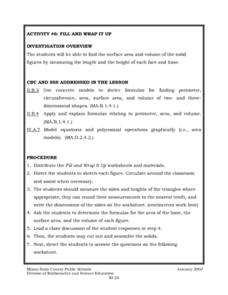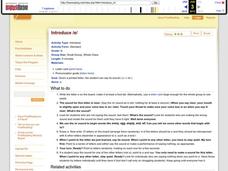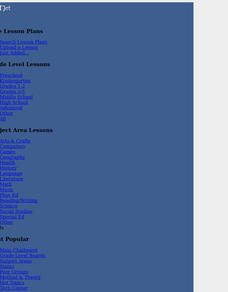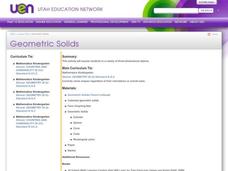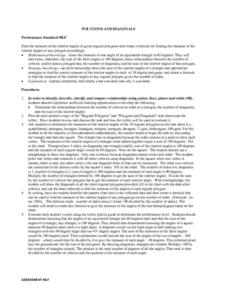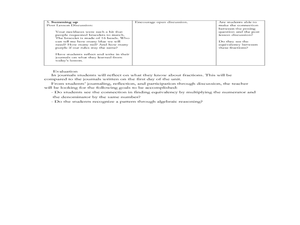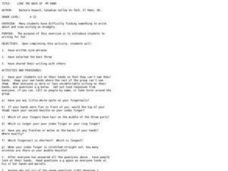Curated OER
Fill and Wrap It Up
Students find the surface area and volume of the solid figures by measuring the length and the height of each face and base. They use concrete models to derive formulas for finding perimeter, circumference, area, surface area, and volume...
Curated OER
Introduce /e/
Examine the most-used letter in the English language incorporating pronunciation, letter recognition, letter sound, and word examples for the letter e. Scholars examine the letter shape and listen to you pronounce the /eee/ sound. As you...
Curated OER
Science: The Shape of Clouds
Students observe cloud formations during a trip outdoors prior to reading Tomie dePaola's , "The Cloud Book." Using cotton, they make models of the four main cloud shapes and mount them on blue construction paper. As an ongoing project,...
Curated OER
Shapes are Everywhere
Second graders gain an understanding of geometric shapes and spatial reasoning. They learn the attributes of solid shapes in everyday activities. Students compare geometric shapes to everday objects, finding things that serve a purpose...
Cord Online
Pyramids and Cones
Young mathematicians find the surface area and volume of a square pyramid and a cone. In what looks like a typical activity out of a textbook, you'll find an activity where learners find an unknown measurement of a pyramid or cone,...
Curated OER
Geometry Journal: Classifying Solids
In this geometry worksheet, 10th graders respond to journal prompts related to prisms and classifying solid shapes. The two page worksheet contains nine questions. Answers are included.
Curated OER
Geometry
In this geometry activity, students identify the different shapes created by nets. They also identify the intersection of lines and planes. There are 5 questions with an answer key.
Curated OER
Visualize 3-D Objects and Make Nets of Common Solids
Prisms are the focus of this geometry worksheet. Students count the number of parts of a prism and chart 26 answers. Vocabulary such as: "faces," "edges," and "verticies" are taught. A well-designed math worksheet!
Curated OER
Lesson Exchange: Polygons (Middle, Mathematics)
Students discover the relationship between the sides of a polygon and the number of diagonals that can be drawn from one vertex, the number of triangles that those diagonals form, and the sum of the interior angles of that polygon.
Curated OER
Geo-Mat
Students review plane figures by playing a game that resembles "Twister." They listen to directions to locate a large example of the figure which is placed on the floor.
Curated OER
Geometric Solids
Students identify and create simple geometric shapes and describe simple spatial relationships. Through discussion, hands-on activities and show and tell, they identify geometric solids in real life and create graphs of commonly found...
Curated OER
Chapter 8 Worksheet 1: Polygons & Angles
In this polygon worksheet, students find the sum of the interior angles of a polygon. They determine the perimeter of equilateral figures, identify concave and convex figures and explore the characteristics of equilateral, equiangular...
Curated OER
Polyhedra Book
In this math activity, learners are asked to read the book that focuses upon the creation and explanation of three dimensional shapes.
Curated OER
Bone Transformations
Students create a picture from the shape of a bone. For this life science and art lesson, students discuss their bones and their purposes, then use a picture of a bone as a starting point for an artistic transformation. Lesson can be...
Science Geek
VSEPR and Molecular Geometry
Many chemistry jokes have no reaction. Presentation begins by explaining what models are and the limitations of various forms before introducing the VSEPR model. Then it outlines the rules for creating a VSEPR model and shows examples of...
Curated OER
Polygons and Diagonals
Students practice measuring the interior angles of given regular polygons and create a formula for finding the measure of th interior angles of any polygon. They determine the relationships between the number of vertices's or sides in a...
Curated OER
3D Computer Imaging Class: Cross-Section Lesson
Students use 3-dimensional materials to create a simple 3-D object. They think about different ways the object could be sliced. Students choose one way to slice the object, and draw the sliced shape on paper or computer. Using a 3-D...
Curated OER
The Function Box
Students look around classroom and identify any patterns they see, describe patterns and explain why they are patterns, use pencil to demonstrate arithmetic patterns by tapping, practice predicting patterns by using Function Box, and...
Pennsylvania Department of Education
Making Cubes
Third graders explore vocabulary associated with three dimensional figures. In this transformations activity, 3rd graders create two dimensional nets for three dimensional figures. Students become familiar with describing two and three...
Curated OER
The Function Box
Students explore arithmetic and numerical patterns. After observing a teacher created function box, students describe a pattern and predict what will "come out" of the function box. They explore patterns such as geometric shapes,...
Curated OER
Crafty Fractions
Fourth graders study fractions. In this fractions lesson, 4th graders define fraction-related vocabulary words. Students use beads to study fractions. Students draw shapes to study fraction equivalency and brainstorm fractions they use...
Curated OER
Like the Back of My Hand
Studentsexamine the back of one hand and write three phrases describing what they see, then write three phrases the shape of their hands remind them of, and look for patterns they've never seen before.
Curated OER
Math: Shapes and More Shapes
Students locate lines of symmetry in regular polygons and predict the number of lines of symmetry in an octagon. In three different polygons, they construct all lines of symmetry and after making their prediction about the octagon,...
Curated OER
Perimeters, Patterns, and Conjectures
Students discover patterns and write conjectures relating to perimeters and polygons. Working in cooperative learning groups, they use manipulatives and graphic organizers to solve problems then answer a series of questions in which they...


